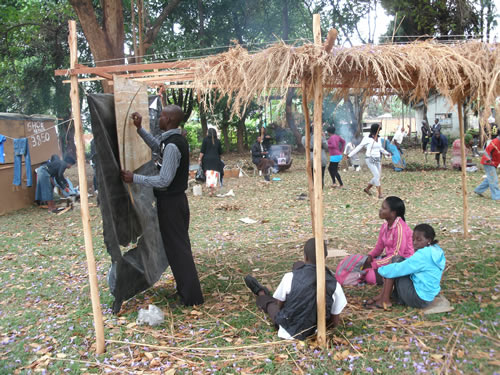The impact of Zimbabwe’s mass evictions on the right to education
Amnesty International Zimbabwe today held a press conference launching a report titled Left Behind: The impact of Zimbabwe’s mass forced evictions on the right to education. The report is based on research assessing the level of access to education at Hatcliffe Extension and Hopely, two settlements created by the government under Operation Garikai, which Amnesty International Zimbabwe has been monitoring since 2005.
Under Operation Garikai, the government provided a small proportion of the 700 000 victims of forced evictions either with houses that were not fully constructed or with un-serviced plots of land, on which those who were resettled were permitted to build houses without receiving any further government assistance. Both Hopely and Hatcliffe extension did not have access to government amenities such as health, education, water or electricity. The majority of households were allocated plots by the government were unable to build decent shelter, and were living in plastic shacks or other poorly constructed structures.
The data presented, was collected between December 2010 and August 2011. Interviews were conducted with 83 individuals, including children, young people, parents and guardians of children affected by Operation Murambatsvina and living in the settlements. Teachers and volunteers at community schools, NGO workers, members of teacher’s trade unions and representatives of UN agencies were also interviewed. The report estimates that at Hopely there are about 2000 children attending makeshift schools constructed and staffed by community members. While UN Special Envoy on Human Settlement Issues Anna Tibaijuka’s report estimates that Operation Murambatsvina estimates that Operation Murabatsvina disrupted the primary and secondary education of 222 000 children, Mwanza noted that a comprehensive study of how many children had lost access to education in Zimbabwe was yet to be done.
Speaking at the launch, Amnesty International Zimbabwe, researcher Simeon Mwanza said that Operation Garikai had been retrogressive to the right to Education. He added that the biggest issue faced by communities at Hatcliffe Extension and Hopely was that government had not made any deliberate investments into restoring livelihoods. The resultant food and financial insecurity made accessing education less of a priority. The long-term impact of this was that a significant proportion of Zimbabwean children, in particular those at Hopely and Hatcliffe, were condemned to a makeshift education. Mwanza stated that the people living in Operation Garikai settlements were excluded from government programmes and services, and Non-governmental organisations were struggling to provide for them. Communities in both settlements had made attempts to meet the need to educate their children by building makeshift schools. However, these had gone unregistered and were thus excluded from government support schemes such as the education transition fund and the per capita tuition grant. In instances where communities had attempted to register schools, they were met with resistance from government officials.
The report concludes:
Violations of economic, social and cultural rights for people living in Operation Garikai settlements, including violation so the right to education, have gone largely unnoticed mainly due to lack of a government mechanism to monitor the situation in these settlements and devise strategies to address human rights violations resulting from Operation Murambatsvina. The government has done little to genuinely consult with the affected communities in order to formulate interventions that address problems experienced by the victims. There is a huge gap between the reality as lived by the affected communities and the stated government policies to address the situation.


